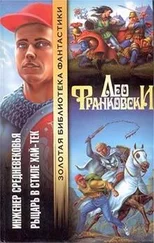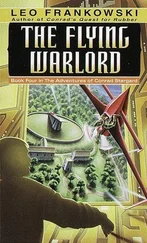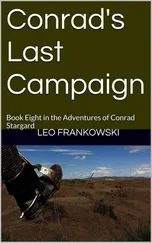Лео Франковски - The Radiant Warrior
Здесь есть возможность читать онлайн «Лео Франковски - The Radiant Warrior» весь текст электронной книги совершенно бесплатно (целиком полную версию без сокращений). В некоторых случаях можно слушать аудио, скачать через торрент в формате fb2 и присутствует краткое содержание. Жанр: Альтернативная история, на английском языке. Описание произведения, (предисловие) а так же отзывы посетителей доступны на портале библиотеки ЛибКат.
- Название:The Radiant Warrior
- Автор:
- Жанр:
- Год:неизвестен
- ISBN:нет данных
- Рейтинг книги:4 / 5. Голосов: 1
-
Избранное:Добавить в избранное
- Отзывы:
-
Ваша оценка:
- 80
- 1
- 2
- 3
- 4
- 5
The Radiant Warrior: краткое содержание, описание и аннотация
Предлагаем к чтению аннотацию, описание, краткое содержание или предисловие (зависит от того, что написал сам автор книги «The Radiant Warrior»). Если вы не нашли необходимую информацию о книге — напишите в комментариях, мы постараемся отыскать её.
The Radiant Warrior — читать онлайн бесплатно полную книгу (весь текст) целиком
Ниже представлен текст книги, разбитый по страницам. Система сохранения места последней прочитанной страницы, позволяет с удобством читать онлайн бесплатно книгу «The Radiant Warrior», без необходимости каждый раз заново искать на чём Вы остановились. Поставьте закладку, и сможете в любой момент перейти на страницу, на которой закончили чтение.
Интервал:
Закладка:
So, a dozen yards was a dozyard. Twelve dozyards was a twelmile and twelve of these was a mile.
Going down, one twelfth of a yard was a twelyard. Divide that by twelve and you had a dozmil, and a mil was about half a millimeter.
Another nice accident that happened was that a cubic yard of cold water weighed slightly under an American ton, and a thousandth of that, or one cubic twelyard, weighed just over an American pound. This gave us a standard of weight and volume. We had a ton, a pound, and a pint, which was the volume of a pound of cold water.
In a few days, I came up with a complete set of weights and measures, all based either on our yard, or in the case of my electrical standards, on Avogadro's number. Our amp was actually related to the number of electrons flowing.
The medieval day was divided into twelve hours, as was the night. But the day was measured from sunrise to sunset. This meant that an hour on Midsummer's day was three times longer than an hour on Christmas day. This made paying people by the hour a little silly. In fact, most men were hired by the day, and were paid half as much in the winter as they were in the summer.
We obviously needed a clock, but when I set out to build one, I was annoyed to discover that I couldn't remember how an escapement worked.
A grandfather clock has a weight which drives a series of gears that turn the hands. The speed of this turning is controlled, slowed down, by a pendulum. The escapement connects the pendulum to the gear train. It must also impart a little energy to the pendulum to make up for friction losses. I couldn't sketch one that I could convince myself would work.
I was hard to live with for three days and then designed a new one. On the fast end of the gear train, I put a large drum with a zigzag groove running around it.
A small wheel attached to the pendulum ran back and forth in the groove.
The gears facing the way they have to, this meant that our pendulum didn't swing from side to side. It swung forward and back. Also, it didn't go tic-toc-tic. It went fump-fump-fump. But nobody here had ever seen a grandfather clock, so I didn't hear any Polak jokes.
I also came up with a new system of time. Staying with the base-twelve standard, we had a twelve-hour day, rather than the usual twenty-four hour day. The clock was reset occasionally so that zero happened at dawn. This was at the nine o'clock position of a modem clock. At the equinoxes, three was at noon, with the fat hand pointing up, and six was at sunset. Midnight was nine, with the fat hand pointing down.
There were four hands on the face, each moving twelve times faster than the one before. After the fat hand, which showed hours, there was a longer arrow for dozminutes, a wiggly hand that showed minutes, and a thin straight hand for twelminutes. Or, you could say that the fat hand went around once a day and the skinny hand went around once a minute. Just remember that our hour was a hundred-twenty modem minutes long, and our minute was as long as fifty modem seconds.
When I got it built, using parts I had made at the brass works, I assembled them in the coffin the carpenters had made for me. I hadn't bothered trying to make anything small, and that coffin was a nice piece of furniture, even though I got sick of looking at it in my bedroom. I had a built in closet and a chest of drawers, anyway.
It took about a week of TLC ("Tender, Loving Care" in the colorful slang of
American engineers) to get it working reasonably well, and it never was accurate to more than one percent, but it was good enough. It had to be oiled daily (goose grease seemed to work best) and the weight raised just as often, but what the heck.
I set the clock up by the south wall of the dining room, so the fat hand, which had a little sun on it, moved about with the position of the sun. People seemed to have very little difficulty reading it, or picking up the concept of standard time. I simply said that we would start work when the fat hand was here, eat dinner when it was there, and stop work when it was over there. Krystyana made sure that the kitchen staff served our meals according to the clock, and that was that. There are advantages to being a medieval lord. No committees!
Our system of measuring angles naturally followed from this clock. Imagining a horizontal line drawn through the axle of the hands, you called out an angle as though it was a time of day as shown by the fat hand. A three o'clock angle was a right angle, and all angles were measured clockwise rather than counterclockwise, as is the modem way of doing it.
I also designed a calendar, with four thirteen-week quarters and no months at all. New Year's Day happened on the winter solstice, and wasn't a day of the week. That is to say, it went Saturday, New Year's Day, Sunday. On leap years, there were two New Year's Days. This meant that the calendar for every year was the same, and should reduce confusion considerably. But I tabled it because I decided that I couldn't get away with it.
I could get away with designing a system of weights and measures because there were so many of them that one more didn't make much difference. I could design a new clock because nobody had ever seen a clock before, not in Poland, anyway.
But the Church had spent centuries fumbling with the calendar and it would take someone with a lot more weight than I had to push a new system through. Maybe once I beat the Mongols.
Toward the end of January, I made my monthly visit to Okoitz. It was part of my contract with Count Lambert.
I got there early in the morning, since my mount, Anna, can travel farther in half an hour than a peasant family can walk in two days.
There was a commotion in the bailey when I got there, and Count Lambert waved me over to one of the peasant's rooms on the outer wall. "Some trouble here, Sir
Conrad. Perhaps you should look at it."
An entire family was lying in the bailey on the usual straw mattresses. They were all dead, with not a mark on them. A man, his wife, and four children lay peacefully as if asleep, their bodies cold and stiff. A fire had burned itself out, but these huts had straw roofs and the walls weren't all that well-sealed.
I didn't see how it would be possible to asphyxiate in there. It hadn't been particularly cold, so I doubt they had all frozen to death.
Food poisoning? I'd seen a woman get ptomaine once, and there had been nothing peaceful about it. There had been vomit all over the place!
Some disease? That had to be it, but I'd never heard of a disease where the person didn't even know he was dying. I came out and said, "I'm mystified, my lord. All I can imagine is some disease. Once these people are taken care of, have sulfur burned in there. Bum all their food stores, on the off chance that they somehow poisoned themselves. In fact, I'd suggest that you have all their belongings burned."
"And fire up your sauna. After they're buried, and get that done today, everyone who has touched the bodies should clean themselves thoroughly. But all that is simply a precaution. I really don't know what killed them." Since I had touched the corpses, I stooped and washed my hands with snow.
"It shall be as you say, Sir Conrad." Count Lambert nodded to one of his men, who went off to make arrangements. "There has been a lot of talk about witchcraft lately. Do you think…?"
"No, my lord, I don't. Any so-called 'witches' around are just a bunch of crazy old ladies. If they would eat properly, most of them wouldn't be senile."
"But everyone knows about witches!"
"Tell me, my lord, why is it that every witch you hear about is a poor miserable old hag? If they really had magical powers, wouldn't they make themselves into beautiful wealthy young women?"
"You have a point there. I'll keep an eye out for beautiful young grandmothers who are rich."
Читать дальшеИнтервал:
Закладка:
Похожие книги на «The Radiant Warrior»
Представляем Вашему вниманию похожие книги на «The Radiant Warrior» списком для выбора. Мы отобрали схожую по названию и смыслу литературу в надежде предоставить читателям больше вариантов отыскать новые, интересные, ещё непрочитанные произведения.
Обсуждение, отзывы о книге «The Radiant Warrior» и просто собственные мнения читателей. Оставьте ваши комментарии, напишите, что Вы думаете о произведении, его смысле или главных героях. Укажите что конкретно понравилось, а что нет, и почему Вы так считаете.










